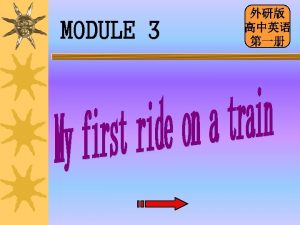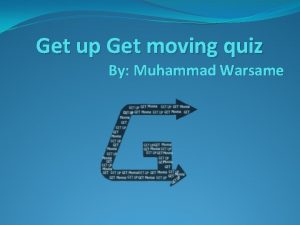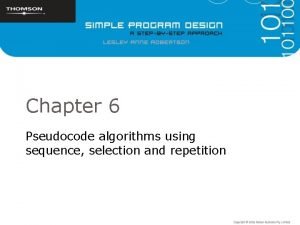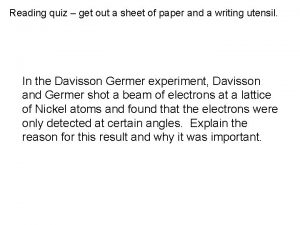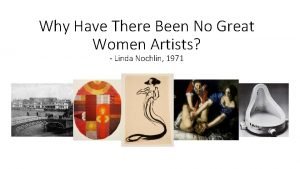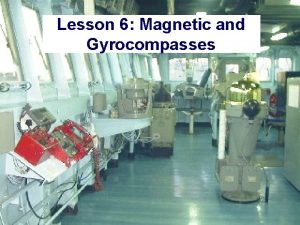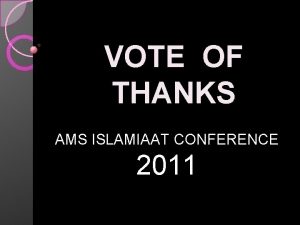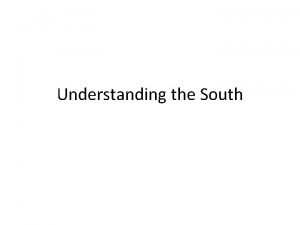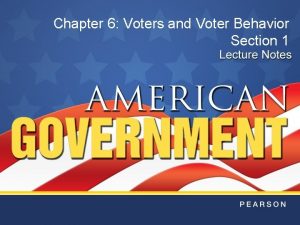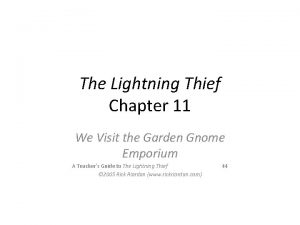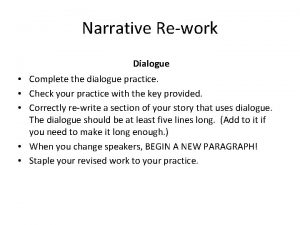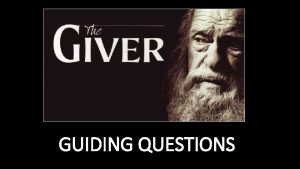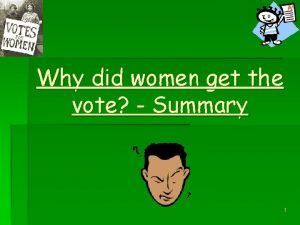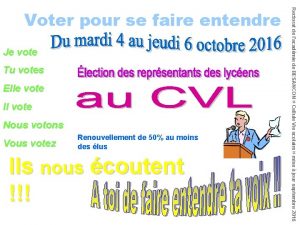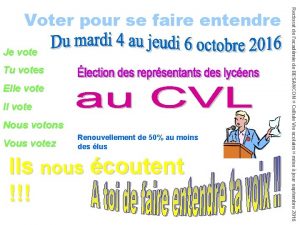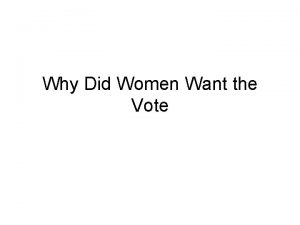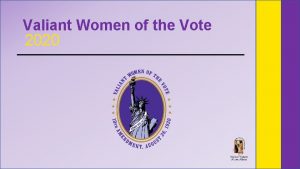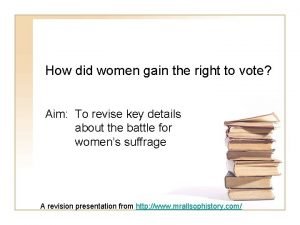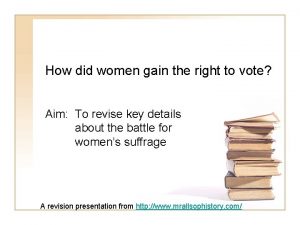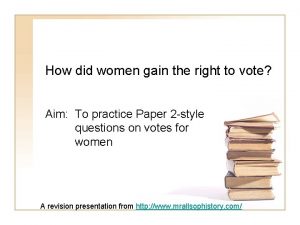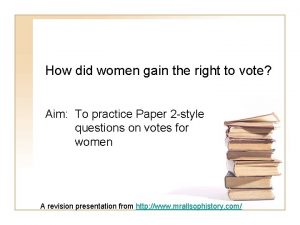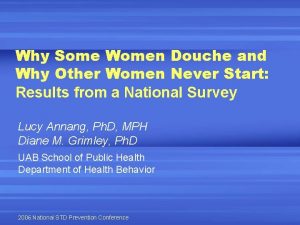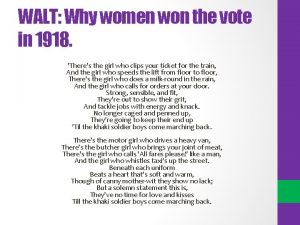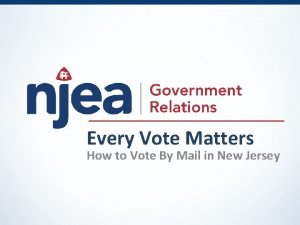Why did women get the vote How did












































![Why did women get the vote? ] • • • 1. 2. 3. 4. Why did women get the vote? ] • • • 1. 2. 3. 4.](https://slidetodoc.com/presentation_image_h/a4ba46c51f3262498a6bd97c297a9fa7/image-45.jpg)
![Why did women get the vote? ] One reason why women got the vote Why did women get the vote? ] One reason why women got the vote](https://slidetodoc.com/presentation_image_h/a4ba46c51f3262498a6bd97c297a9fa7/image-46.jpg)





- Slides: 51

Why did women get the vote?

How did women’s rights improve? Use the information sheet to put together a timeline of each improvement in women’s rights: 1800 s seen as inferior because… 1867/84 1888 married women’s property act 1860 -90 1899 New Zealand gives women the vote 1897 1903 1910 -12 Home rule crisis (Ulster crisis) in Ireland 1913 1914 1917 1918 1928

What were the reasons for women getting the vote? Context: • Women couldn’t vote until 1918 • = men only in 1928 • Campaigns had begun with Mary Wollstonecraft 1790 s, and first attempt at a law in 1867 • Why did it take so long?


Why did women get the vote? Possible reasons: • Changing attitudes • Suffragist pressure • Suffragette pressure • Politicians (mistakes / changing their minds) • WWI Use the information sheet to put together a timeline of each improvement in womens rights: 1800 s, 1867/84, 1888, 1860 -90, 1899, 1897, 1914,

Why was women’s social position a problem? • For middle class women? • For working class women? Queen Victoria “the mad wicked folly of women’s rights” Why did she say this?

Why did women want the vote? Which of the following were true in 1880? 1. Husband could beat his wife 2. A husband could rape his wife 3. Educated women seen as bad mothers 4. Hysteria = disease of women only- secretions from the womb send them mad 5. Women couldn’t go to toilet away from home 6. Women’s clothes controlled them 7. Women could run the country Why would getting the vote change this?

They’re all true! Watch the video and add the notes to your timeline. . . Andrew Marr making of modern britain Andrew Marr on suffragettes

Public vs Private spheres: Middle class women’s trap • women had no place in national politics • could not stand as candidates for Parliament. • Not allowed to vote. • husbands would take responsibility in political matters. • Men’s role = public life, work • woman's role = child-rearing = charity = taking care of the home

Working class women’s trap: • Were allowed to work • But subservient to men • Had to do ‘women’s work’ eg domestic service • Trade Unions protected men’s working position

Reason #1 Changes in Society? Yes: • 1873: Infant Custody Act • 1882: Married Women’s Property Act • 1870 s compulsory primary education • 1894: Local Gov Act- vote in local elections • Increasing office jobs But: • Marriage bar

Reason #1 Changes in Society? Yes: • 1873: Infant … • 1882: _____Property Act • 1870 s • 1894: Local Gov Act • Increasing office jobs But: • Marriage bar

#1 Why did things begin to change in society? • industrial revolution, • many women in full-time employment • had opportunities to meet in large organised groups to discuss political and social issues. • NB difference between middle and working class women

Were changing attitudes responsible? Put the following into a table YES & NO • Vindication of the Rights of Women 1793 by Mary Wollstonecroft =“women are deliberately kept as childlike, dependent people. ” • Married Women’s Property Act 1882 • Primary education 1870 • Cambridge University 1948 • Local Government Act 1894 allowed women right to vote in local elections • 1912 24/11, 140 on town councils • Participating in charities etc

Reason #2 Organised suffrage movements? • • 1793 Mary Wollstonecraft 1866: Organised campaigns for women's suffrage 1867 - debate over 2 nd Reform Bill John Stuart Mill proposed an amendment =give the vote to women on the same terms as men rejected by 194 votes to 73. The campaign gained momentum after this. Became known as ‘the cause’. = Suffragists (campaigning for suffrage = right to vote) 1894 women could vote in many local council elections.

Reason #2 Organised suffrage movements? • • 1793 Mary Wollstonecraft 1867 - debate over. . . John Stuart Mill proposed… = _____ (campaigning for suffrage = right to vote)

Suffragists and suffragettes • two wings • the suffragists: 1866 • suffragettes: 1903

Why did women want the vote? • Middle class women: to get an alternative to marriage • NB surplus of 1 million women- so spinsterhood likely • Working class: to improve working conditions and pay

How successful were the suffragists? • 1897, various local women's suffrage societies formed the National Union of Women's Suffrage Societies Leader= Millicent Fawcett • wanted the vote for middle class property-owning women • 6000 members by 1909 Methods: peaceful tactics – • non-violent demonstrations, • petitions • lobbying MPs. Aims: • seen to be intelligent, polite and law-abiding • prove themselves responsible enough to participate fully in politics- ie equal of men.

How successful were the suffragists? • 1897 = NUWSS = Leader= • wanted the vote for middle class property-owning women • ______members by 1909 Methods: peaceful tactics – • . Aims: • prove themselves. . .

Who were the suffragists? • The leadership = middle class • Saw vote as means of opening up professions etc • more radical members wanted support of working class women. • Ie: wanted to link getting vote for women to – other problems for women. – To getting the vote for men – To draw society together (socialist aims)

How successful were the Suffragists? Yes • By 1900 many MPs won over • several Bills for women's suffrage – not passed • ? only a matter of time to gain the vote • some support from Trade Unions (eg with new Labour party) • Liberal PM Sir Campbell- Bannerman supported them 1908 • 53, 000 members by 1914 • ? People who hated the suffragettes? NO: • No bills passed • PM died- new one Asquith- against women’s suffrage • Papers ignoring them by 1905

How successful were the Suffragists? Yes • By 1900 MPs= … • several Bills … • some support from … • _______supported them 1908 • By 1914 members = • ? People who hated the suffragettes? NO: • No bills … • PM died- new one = • Newspapers …

Who were the suffragettes? . • • • Nickname: given to them by The Daily Mail born out of the suffragist movement. Leaders: Emmeline Pankhurst member of the Manchester suffragist group, grown impatient with the middle class, respectable, gradualist tactics of the NUWSS. • 1903 she decided to break with the NUWSS. • Created the Women's Social and Political Union • Oct 1905 heckled Sir Edward Grey

Who were the suffragettes? . • • Nickname: born out of the … Leaders: grown impatient with… 1903 … Created the WSPU = Oct 1905 …

What were suffragette methods? • • active organisation with young working class women, to draw attention to the cause. The motto of the suffragettes was 'deeds not words' • 1912 onwards they became more militant and violent in their methods of campaign. • Tactics: – Law-breaking, heckling – violence , letter box attacks, Whitekirk

How successful were the suffragettes? • 1907 the Women's Social and Political Union itself split • 70 left to form Women’s Freedom League • Emmeline Pankhurst and her daughter Christabel came into conflict with other members of the WSPU's executive body. • Pankhursts = tighter grip on WSPU. • Pankhursts ‘dictatorial’- no democratic decision making!! • By 1913 few still campaigning

How successful were the suffragettes? • • • 1907 …. 70 left to form. . . Pankhursts conflict with … Pankhursts = By 1913 …

How successful were the suffragettes? . • 1909 the WSPU = branches all over the country • published a newspaper 'Votes for Women' 20, 000 copies each week. • NUWSS also flourishing= rising membership • efficient nation-wide organisation

How successful were the suffragettes? • • . message = worked together. By 1909 … newspaper called 'Votes for Women' =_______ copies weekly. • NUWSS doing well =membership…

What was the governments response? • • • Refusal to negotiate Police used to stop them Prison for law breaking Force-feeding of hunger-strikers (Perth) Cat and Mouse Act = let hunger strikers out, then arrested them again

What was the governments response? • • • Refusal to. . . Stopped them with. . . Put them in. . . ______of hunger-strikers (Perth) Cat and Mouse Act =

Did violence help the cause? YES: • rough treatment of suffragettes arrested • jailed during the course of their protests • Hunger strikes • Forced feeding • Cat & Mouse Act • =increasing sympathy from the public.


Did violence help the cause? NO: • Made women look unreasonable & hysterical • Government had other major problemsrecession, trade union strikes • Couldn’t be seen to be ‘giving in’ to violence • actually delayed votes for women by its "irresponsibility" in attacking private property. • Pankhursts alienated own supporters- see WFL • Few still fighting by 1913

Did violence help the cause? NO: • Made women look. . . • Government had other major problems-. . . • Couldn’t be seen to be ‘giving in’ to violence • delayed votes for women by … • Pankhursts alienated … • _____still fighting by 1913

Which group was more effective? • influence of NUWSS has not been given enough credit. • Membership of this organisation remained high • Many women alienated from the suffragettes because of their militancy switched to the suffragists.

Which group was more effective? • NUWSS … • Membership … • Many women …

Did WWI help women get the vote? • Women’s war work = Munitionettes, FANYs, VAD • Demonstrated = to men • Fought for Britain = have rights too • So logical to give them right to choose governments (who send them to war) • But, young women not given the vote (ie the ones who did the war work)

Did WWI help women get the vote? • • Women’s war work = … Demonstrated = … Fought for Britain = So logical to give them right to choose governments (who send them to war) • But, …

Did politics give women the vote? • Before 1918 vote based on property • After WWI all men given the vote (because had fought in the war) • Therefore right to vote based on citizenship, not property • Therefore women also citizens, so could also vote

Did politics give women the vote? • Before 1918 vote based on … • After WWI all men given the vote (because had fought in the war) • Therefore right to vote based on _____not property • Therefore …

Why did women get the vote? 1. 2. 3. 4. 5. 6. Social change Increase of franchise Suffragists Suffragettes Politicians War

Consequences: Why did women get the vote? • • • 1. 2. 3. 4. 5. 6. In groups of x 4 Each of you write a starter sentence for a paragraph to answer the Q: ‘One reason why women got… was…. Pass it on, then next person writes an example sentence Pass it on, and write an explanation, ‘This meant that…’ then a balancing sentence ‘On the other hand… Social change Suffragists Suffragettes War Increase of franchise anyway (chance) Politicians
![Why did women get the vote 1 2 3 4 Why did women get the vote? ] • • • 1. 2. 3. 4.](https://slidetodoc.com/presentation_image_h/a4ba46c51f3262498a6bd97c297a9fa7/image-45.jpg)
Why did women get the vote? ] • • • 1. 2. 3. 4. 5. 6. Write your own paragraph – get it checked on screen a starter sentence for a paragraph to answer the Q: ‘One reason why women got… was…. an example sentence an explanation, ‘This meant that…’ then a balancing / linking sentence ‘On the other hand… Social change Suffragists Suffragettes War Increase of franchise anyway (chance) Politicians
![Why did women get the vote One reason why women got the vote Why did women get the vote? ] One reason why women got the vote](https://slidetodoc.com/presentation_image_h/a4ba46c51f3262498a6bd97c297a9fa7/image-46.jpg)
Why did women get the vote? ] One reason why women got the vote was the actions of politicians. Throughout their campaign key politicians were vital. It was the House of Lords that had blocked things up until 1911 when they lost their veto because of the budget changes. Campbell Bannerman was the leader in 1906 and he had been in favour, but when he left Asquith was against women getting the vote so this made things difficult until he left office in 1915. The new Prime Minister, Lloyd George was very in favour and this connects strongly with him passing the law a few years later at the end of World War I in 1918. However these leaders would not have done anything if they hadn’t been persuaded by the publicity created by so many campaigning groups such as the Suffragists; leaders alone are not enough to pass laws in the House of Commons.

Were the Suffragists responsible? Put the following into a table YES & NO • Origins 1867 Second Reform Bill • NUWSS unified groups 1897 • Millicent Fawcett leader = ‘peaceful persuasion • Meetings pamphlets petitions bills meant by 1909 “many if not most MPs supported women’s suffrage” • Gained some Trade Union support + Labour party • 6000 members 1909 to 53, 000 by 1914 • ? Because Suffragettes drove people to them!

Were Suffragettes responsible? Put the following into a table YES & NO • WSPU • 1903 founded by Emmeline Pankhurst and her 2 daughters • Frustrated by slow NUWSS • By 1901 newspapers seldom reported meetings • Motto ‘Deeds not words’ • 1905 heckled Sir Edward Grey • Arrested- struggled- shocked nation

Were Liberal government mistakes responsible? Put the following into a table YES & NO • Won 1906 - expected to give women vote • Asquith, leader 1908, against it • Caused a Suffragette ‘war’ • = windows smashed, acid in pillar boxes, burning buildings, stations, Churches • Imprisoned • Suffragettes upped the stakes • 1910 hunger strikes • Gov responded with forced feeding (Perth prison) • Looked like torturing nice middle class ladies • Responded to bad press with ‘Cat & Mouse Act’

Did Suffragettes harm the cause? Put the following into a table YES & NO • 1912 Lord Robert Cecil “women have broken the law… and have brought disgrace and discredit upon their sex” • Pankhursts had domineering leadership style • 70 left to form Women’s freedom League 1907 • By 1914 WSPU had few members left • 1911 special campaign against Suffragettes • Summer 1914 all leaders in prison or hiding • Failed to ally with Labour • Proved women’s ‘sillyness’ • Pugh thinks had little impact- just were publicists

Was WWI responsible? Put the following into a table YES & NO • WSPU lead campaign for volunteering • 700, 000 women in munitions, 200, 000 in other ‘men’s’ jobs • After war women lost their jobs • Mainly young women who worked, over 30 s got the vote • Gave the vote 1918 on basis of age and property -? To prevent full equality? • Real reform was giving men the vote, women tacked on as an extra
 Get into/out of
Get into/out of Shot me out of the sky one direction
Shot me out of the sky one direction Hey hey bye bye
Hey hey bye bye Why did the fleeing women have trouble breathing
Why did the fleeing women have trouble breathing Why is this political cartoon called “one less vote?”
Why is this political cartoon called “one less vote?” Why were the littluns used to stomach aches
Why were the littluns used to stomach aches Get up get moving quiz
Get up get moving quiz Get up get moving quiz
Get up get moving quiz Get up get moving quiz
Get up get moving quiz Example of sequence in pseudocode
Example of sequence in pseudocode Get focused get results
Get focused get results Get up get moving quiz
Get up get moving quiz Dont ask why why why
Dont ask why why why Why have there been no great women artist
Why have there been no great women artist Why were women naturally distrusted
Why were women naturally distrusted How did the rise of islam change the lives of women?
How did the rise of islam change the lives of women? Did women have a renaissance
Did women have a renaissance Sbc vote compass
Sbc vote compass Can a dead man gyro error
Can a dead man gyro error Boitier de vote interactif amazon
Boitier de vote interactif amazon Before you turn in an essay proofread it thoroughly
Before you turn in an essay proofread it thoroughly Vote of thanks speech for teachers
Vote of thanks speech for teachers Arachnoiditis treatment
Arachnoiditis treatment Gyrocompass
Gyrocompass Your vote your choice
Your vote your choice Vote of thanks
Vote of thanks The first vote
The first vote Boitier vote interactif powerpoint
Boitier vote interactif powerpoint Majority vote circuit
Majority vote circuit Vote democracy
Vote democracy Wash düzenli fiil mi
Wash düzenli fiil mi Emmett school district 221
Emmett school district 221 Chapter 6 voters and voter behavior
Chapter 6 voters and voter behavior Turn in your homework
Turn in your homework Vote.election-europe.com/fcpe-safran
Vote.election-europe.com/fcpe-safran Chapter 11 lightning thief
Chapter 11 lightning thief Now you know why i couldn't wait to get here said esteban
Now you know why i couldn't wait to get here said esteban Dog period
Dog period The giver chapter 18 questions
The giver chapter 18 questions What act does mercutio die
What act does mercutio die Why is it difficult to get poison in mantua
Why is it difficult to get poison in mantua Hát kết hợp bộ gõ cơ thể
Hát kết hợp bộ gõ cơ thể Bổ thể
Bổ thể Tỉ lệ cơ thể trẻ em
Tỉ lệ cơ thể trẻ em Chó sói
Chó sói Glasgow thang điểm
Glasgow thang điểm Bài hát chúa yêu trần thế alleluia
Bài hát chúa yêu trần thế alleluia Các môn thể thao bắt đầu bằng tiếng đua
Các môn thể thao bắt đầu bằng tiếng đua Thế nào là hệ số cao nhất
Thế nào là hệ số cao nhất Các châu lục và đại dương trên thế giới
Các châu lục và đại dương trên thế giới Công thức tính độ biến thiên đông lượng
Công thức tính độ biến thiên đông lượng
